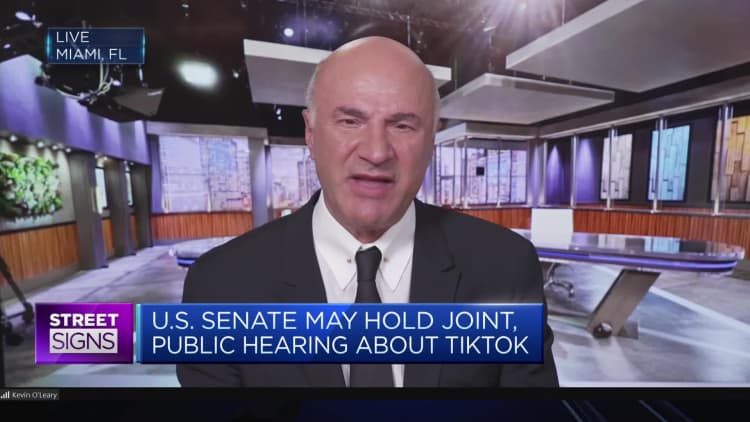Photo illustration shows the TikTok logo displayed on a mobile phone screen.
Sopa Images | Lightrocket | Getty Images
Canadian investor Kevin O’Leary is still interested in a TikTok deal, but it’s not possible under current law, he told CNBC, as President Donald Trump extended the deadline for a ban on the social media platform.
As part of a wave of executive orders after his inauguration Monday, Trump delayed by 75 days the imposition of a law that would see TikTok effectively banned, allowing his administration “an opportunity to determine the appropriate course of action.”
Trump had promised the move in a social media post on Sunday, also floating a deal that would see the platform stay active in the U.S. under a joint venture with 50% American ownership.
“That 50/50 deal, I would love to work with Trump on, so would every other potential buyer … But the problem with some of these ideas is they are inconsistent with the ruling of the Supreme Court,” said the investor, widely known from his role in ABC’s “Shark Tank.”
O’Leary announced that he, along with “The People’s Bid for TikTok,” an effort led by Project Liberty Founder Frank McCourt, had offered ByteDance $20 billion in cash to buy TikTok in an appearance on Fox News’ “America’s Newsroom.”
Speaking to CNBC, he said the proposed deal did not include ByteDance’s TikTok algorithm, which has been a key point of scrutiny from U.S. lawmakers, adding that his group had an alternative algorithm.
ByteDance had not announced any deals before a Sunday deadline to divest from TikTok after the Supreme Court upheld the Protecting Americans from Foreign Adversary Controlled Applications Act, or PAFACA, which applies to TikTok.
McCourt confirmed to CNBC that the Project Liberty team remained “ready to work collaboratively with the Trump Administration, ByteDance, and a consortium of American partners to finalize this critical deal.”
“Project Liberty has a proven tech stack that is already in use and offers a clear path to address the national security concerns of Congress while keeping TikTok operational,” he added.
Legal hurdles
Firms involved with TikTok have had differing reactions to Trump’s executive order. Service providers such as Oracle and Akamai have willingly kept TikTok online, while Apple and Google are yet to restore ByteDance-owned apps on their stores.
According to O’Leary, while Trump’s ban extension has likely lent protection to the likes of Oracle and Akamai, it’s unclear if ByteDance’s deadline to divest will be extended.
“What we need is not really a 75 day extension. What we need is to go back and ask congress to open the order and provide for these new options, because they’re not provided for right now,” he said.
“I would love to do a deal, if the law provided for it, but I don’t have the luxury of breaching the order of the Congress,” he added.
Law experts who spoke to CNBC agreed that the legal status of TikTok and Trump’s executive order remained uncertain and that any efforts to make a TikTok deal could face challenges.
“The Order does not appear to comply with the statute. Congress carefully included certain dates and procedures in the law, which SCOTUS found to be constitutional,” said Carl Tobias, a law professor at the University of Richmond.
“Thus, a federal court could find that the Order violates the law and invalidate it,” he said, adding however that such an action could take a long time if the government appealed to SCOTUS.
Sarah Kreps, Director at the Tech Policy Institute at Cornell University, agreed the executive order was not consistent with Supreme Court’s decision, adding that it said nothing about progress toward a qualified divestiture.
Given that violators of the TikTok law could face billions in fines, it’s not entirely prudent for parties to take Trump’s assurances over the law and SCOTUS’s ruling, Kreps said.
“They’re certainly gambling with the law and putting considerable faith in executive authority,” she added.
China softens stance?
O’Leary told CNBC that TikTok could fetch $20-$30 billion on the market in March last year, a huge discount, given any sale would likely exclude the platform’s algorithms.
Instead, the value in a potential deal was the opportunity to gain the strong domestic brand of TikTok and its over 100 million users, he said.
Still, around the time conversations about a TikTok sale ramped up, Beijing was seen as a major barrier to a BytdeDance divestment.
However, Beijing recently signaled openness to a deal that would see U.S. companies gain ownership of the platform.

“When it comes to actions such as the operation and acquisition of businesses, we believe they should be independently decided by companies in accordance with market principles,” a Beijing spokesperson said Monday when asked about President Donald Trump’s proposal.
According to O’Leary, any potential sale of ByteDance is still expected to be negotiated between Trump and Chinese President Xi Jinping.
“With TikTok, I have the right to either sell it or close it, and we’ll make that determination and we may have to get an approval from China too,” Trump told reporters following his inauguration.
While signing the executive order, the President reportedly suggested that he could impose tariffs on China if Beijing failed to approve a U.S. deal with TikTok. On Monday stateside, he said he would consider the likelihood of Tesla CEO Elon Musk or Oracle Chairman Larry Ellison buying TikTok.
Meanwhile, O’Leary told CNBC said he was in Washington still working on a potential TikTok deal with U.S. lawmakers.
